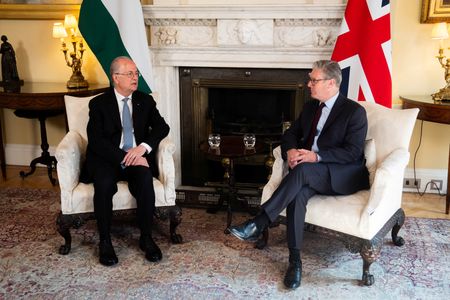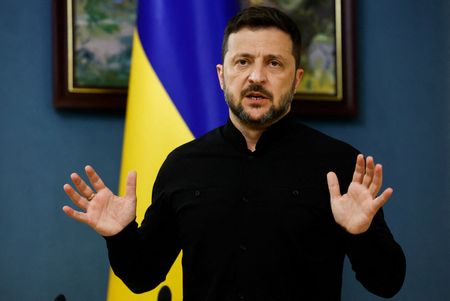By Andrew MacAskill and Catarina Demony
LONDON (Reuters) -Prime Minister Keir Starmer said on Friday the British government would recognise a Palestinian state only as part of a negotiated peace deal, disappointing many in his Labour Party who want him to follow France in taking swifter action.
President Emmanuel Macron said on Thursday France would recognise a Palestinian state, a plan that drew strong condemnation from Israel and the United States, after similar moves from Spain, Norway and Ireland last year.
After discussing with Macron and German Chancellor Friedrich Merz ways to pressure Israel to end its war in Gaza, Starmer said he was focused on the “practical solutions” that he thought would make a real difference to ending the war.
“Recognition of a Palestinian state has to be one of those steps. I am unequivocal about that,” he said. “But it must be part of a wider plan which ultimately results in a two-state solution and lasting security for Palestinians and Israelis.”
Over 220 members of parliament – about a third of lawmakers in the House of Commons and mostly Labour members – wrote to Starmer on Friday urging him to recognise a Palestinian state.
Successive British governments have said they will formally recognise a Palestinian state when the time is right, without ever setting a timetable or specifying the necessary conditions.
‘TOO TIMID’
London’s Labour Mayor, Sadiq Khan, and Labour lawmakers on parliament’s foreign affairs select committee said this week Britain should recognise a Palestinian state. A government minister, Shabana Mahmood, said doing so would bring “multiple benefits” and send a message to Israel.
Parliament’s foreign affairs committee said on Friday “the government cannot continue to wait for the perfect time because experience shows that there will never be a perfect time.”
One Labour member of parliament told Reuters there was unhappiness with Starmer in the party over the government’s failure to take further diplomatic steps to condemn Israel.
“Most of us are outraged by what is happening in Gaza and think we are being too timid,” the lawmaker said.
Starmer’s approach to the issue has been complicated by the arrival in Scotland later on Friday of U.S. President Donald Trump, with whom he has built warm relations.
In foreign policy terms, Britain has rarely diverged from the United States.
“The question becomes one around dependence on the U.S., and if causing a rift with Washington – which is so closely aligned with Tel Aviv – is something London can afford to do,” said H. A. Hellyer, a senior associate fellow at the Royal United Services Institute in London.
“There is a sense at the highest levels of government in London that the Trump administration could very easily and erratically change tack on issues that the UK is really concerned about.”
(Reporting by Andrew MacAskill and Catarina Demony; additional reporting by Kirsty Needham in Sydney; editing by Helen Popper and Mark Heinrich)










